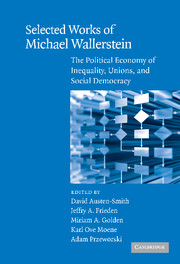 Selected Works of Michael Wallerstein
Selected Works of Michael Wallerstein Published online by Cambridge University Press: 27 January 2010
“It is but equity, besides, that they who feed, cloath and lodge the whole body of the people, should have such a share of the produce of their own labour as to be themselves tolerably well fed, cloathed and lodged.”
– Adam Smith 1776“One has to understand that the ongoing crisis is not a crisis of real poverty, but an organizational crisis. The world is like a ship loaded with the goods of life, where the crew starves because it cannot figure out how the goods should be distributed.”
– Ragnar Frisch 1931Social democracy, it is often said, is nice but pricey. Whatever its merits in the rich countries of Western Europe, social democracy is frequently dismissed as an infeasible model for developing countries. Based on generosity towards the poor and protection against market competition, the argument goes, social democracy is only possible in consensual, homogeneous, and affluent societies with an extraordinary commitment to equality. In Third World countries that are conflict-ridden, heterogeneous, and poor, does the social democratic model have any relevance?
In this article we offer an agnostic view of the feasibility of the social democratic model of development in the Third World. First, we argue that consensus, homogeneity, and affluence are products of the social democratic model, not prerequisites. Second, we claim that the central social democratic policy in terms of economic development is the policy of wage compression attained through highly centralized wage-setting institutions.
To save this book to your Kindle, first ensure no-reply@cambridge.org is added to your Approved Personal Document E-mail List under your Personal Document Settings on the Manage Your Content and Devices page of your Amazon account. Then enter the ‘name’ part of your Kindle email address below. Find out more about saving to your Kindle.
Note you can select to save to either the @free.kindle.com or @kindle.com variations. ‘@free.kindle.com’ emails are free but can only be saved to your device when it is connected to wi-fi. ‘@kindle.com’ emails can be delivered even when you are not connected to wi-fi, but note that service fees apply.
Find out more about the Kindle Personal Document Service.
To save content items to your account, please confirm that you agree to abide by our usage policies. If this is the first time you use this feature, you will be asked to authorise Cambridge Core to connect with your account. Find out more about saving content to Dropbox.
To save content items to your account, please confirm that you agree to abide by our usage policies. If this is the first time you use this feature, you will be asked to authorise Cambridge Core to connect with your account. Find out more about saving content to Google Drive.